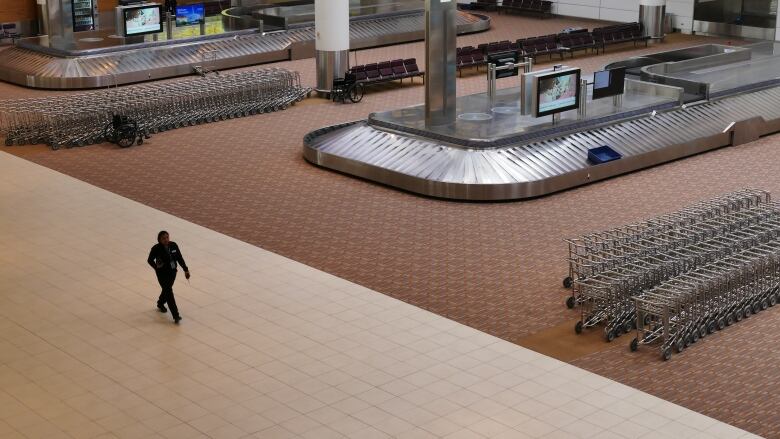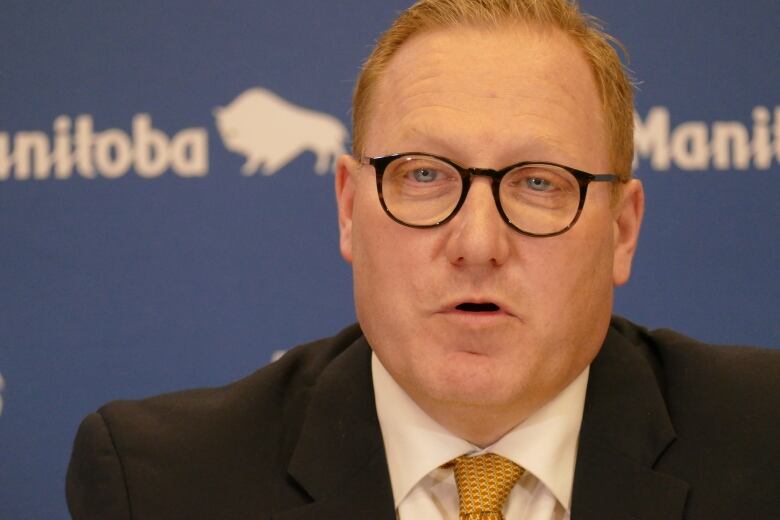Manitoba government delivers cautious budget as COVID-19 rattles economy
Revised budget estimates negative economic growth in 1st half of 2020, rebound by end of year

While the province's economy is reeling from COVID-19, the Manitoba government unveiled a cautious budget Thursday that it still believes can fend off an economic downturn while delivering on tax cuts.
The budget, delayed more than a week by procedural delays from the Opposition NDP, was originally set to be delivered on March 11 the day beforethe first presumptive case of COVID-19 was announced in Manitoba.
Premier Brian Pallisterpre-empted major budget surprises by announcing an upcoming one percentage point cut to the provincial sales tax and changes to the payroll tax, along with unveiling the province's own carbon tax, earlier this month.
The Progressive Conservative governmenthas decided to keep those measures, but in recent days has tempered budget plans that were revealed under embargo last week
"Because COVID-19 is a rapidly changing situation, we cannot provide specific details in respect to our 'bottom line,'" theprovince said in the supplemental budget documents.
That revised budget maintains a $300-million injection into therainy-day fund, intended to be used for unforeseen expenses, but speeds up the process.
The province will top up the fund currently sitting at $571 million to $800 million over the next month. It will add another $72 million by the end of the 2020-21 fiscal year.
The province is also downgrading economic projections due to COVID-19. The government is forecasting "a large initial decline in economic growth" for the first half of 2020, including a forecast 1.3 per cent drop in real GDP for the first quarter of the year, and an expected drop in the second and third quarters as well. But a recovery is forecast by the end of the fiscal year.
"Growth in 2021 may be higher than currently forecast as a result of the return of pent-up demand across impacted sectors," the province said in its Thursday news release.
Otherwise, the Pallister government appears confident the province's diversified economy can withstand the pandemic.

The rest of the spending plan landed Thursday with few surprises.
In addition to the $300 million for the rainy-day fund, an additional $100 million is set aside for the emergency expenditures fund.
Manitoba Premier Brian Pallister said the government is showing it can be adaptable.
"We have to be more resilient than we've ever been in the past," Pallister said Thursday.
The budget was originally intended to be released on March 11, but those plans were thwarted when the New Democrats delayed several days of legislative business to prevent Fielding from delivering his budget speech.
The Opposition said the delay wasn't intended to prevent the budget, but to halt several other pieces of legislation the government could have introduced as early as last Wednesday.
Deficit could hit $900M
The original budget document said the government intended to whittle down its deficit by an extra $140 million this year, with a projected $220-million deficit for the 2020-21 fiscal year.
But that deficit could now be far higher as high as $900 million, according to the province's worst-case scenario.
Any bottom line estimates arein limbo because of the pandemic, the government said in the updated COVID-19 supplement it released with the budget on Thursday, and the province says the impact on economic growth could approach $700 million.
"The range of revenue impacts from the lowest to highest scenarios are from approximately $160 million to more than $680 million," the province's budget says.
Fielding acknowledged last week the province could have balanced the budget this year, but chose to focus on preparedness instead.
"Potentially we could have [balanced], but we need to be emergency ready," he told reporters last week.
While the budget projects an economic rebound in the last half of 2020, Fielding said last week up to $500 million worth of plans could be delayed by a significant downturn. He didn't specify what those projects are.
Vehicle registration fee cut
While the government sets money aside, the Pallister government's fifth budget plans to return more cash to Manitobans.
The province will cut vehicle registration fees by 10 per cent and eliminate the probate fees fees paid on the estate of a deceased person by July 1.
The removal of the PST from home insurance and salon services over $50, which was promised in last fall's election, will happen next year, Fielding said.
July 1 is also the implementation date for the new provincial carbon tax, which was previously announced. When questioned at last week's news conference, Fielding could not point to any new climate change-mitigation initiatives in the budget aside from the upcoming $25 per tonne carbon tax.
That carbon tax "absolutely has the potential" to discourage people from using fossil fuels, he said.
The budget allocates $101 million for the Lake Manitoba and Lake St. Martin flood outlets project, which still needs approval from the federal government.
The spending plan dedicates an extra $22 million for Winnipeg's North End water treatment facility. The deposit will increase the province's commitment for the roughly $400-million first phase of the project to $56 million.
For the third consecutive year, funding grants for municipalities will remain flat at $313 million.
Shift from providing public housing
The budget also signals a shift in the province's role in public housing. The role of the Manitoba Housing and Renewal Corporation will transition from housing provider to becoming a funder and regulator, the budget explains.
"It seems to be working better," Pallister said Thursday, saying there'sbetter maintenance and more available housing stockin the units that have already transitioned to the private sector.
The province is also committing $5 million to implement the education reforms arising out of its kindergarten to Grade 12 review, but the government is now postponing any significant reforms until summer 2021 because of COVID-19.
The budget includes financial support for 4,400 new classroom spaces that will either be open or under construction by the end of the fiscal year, as well as 1,000 more early learning and child care spaces.
The budget also contains a tax increase for smokers the tobacco tax will rise from 30 cents per cigarette to 30.5 cents.
The government estimates $15 million in net revenue from the sale of legalized cannabis over the coming year the first time revenues from cannabis have been projected in a budget.
"Cannabis revenues are not the fiscal windfall that some had forecast," the province's budget documents say.
NDP Leader Wab Kinewsaid thegovernment needs to step up during a pandemic. He suggested the province could top up the income for people on employment insurance and help with child-care fees.
Kinew questioned the need for a PST cut at this time.
"It doesn't seem like it makes a lot of sense now," Kinew said, arguing the tax savings would be minimalsince most expenses are PST-exempt groceries.
Pallisterargued earlierthat giving Manitobans more money back helps people get by financially during the pandemic.
Liberal Leader Dougald Lamont said it's disappointing that other provinces andgovernments created measures to help laid off workers, but Manitoba's government cannot.
"We need a plan to be able to support workers so they can pay their bills and prevent businesses from going broke."
The budget made a number of other projections before the mass business closures due to the coronavirus.
Total provincial spending is projected to rise $477 million this fiscal year to $17.96 billion.
Transfers from Ottawa are slated to increase$321 million to $5.14 billion. Manitoba now relies on Ottawa for 29 per cent of its revenue.
Manitoba's total debt is expected to rise to $26.4 billion, up $336 million from 2019-20.












_(720p).jpg)


 OFFICIAL HD MUSIC VIDEO.jpg)
.jpg)



























































































